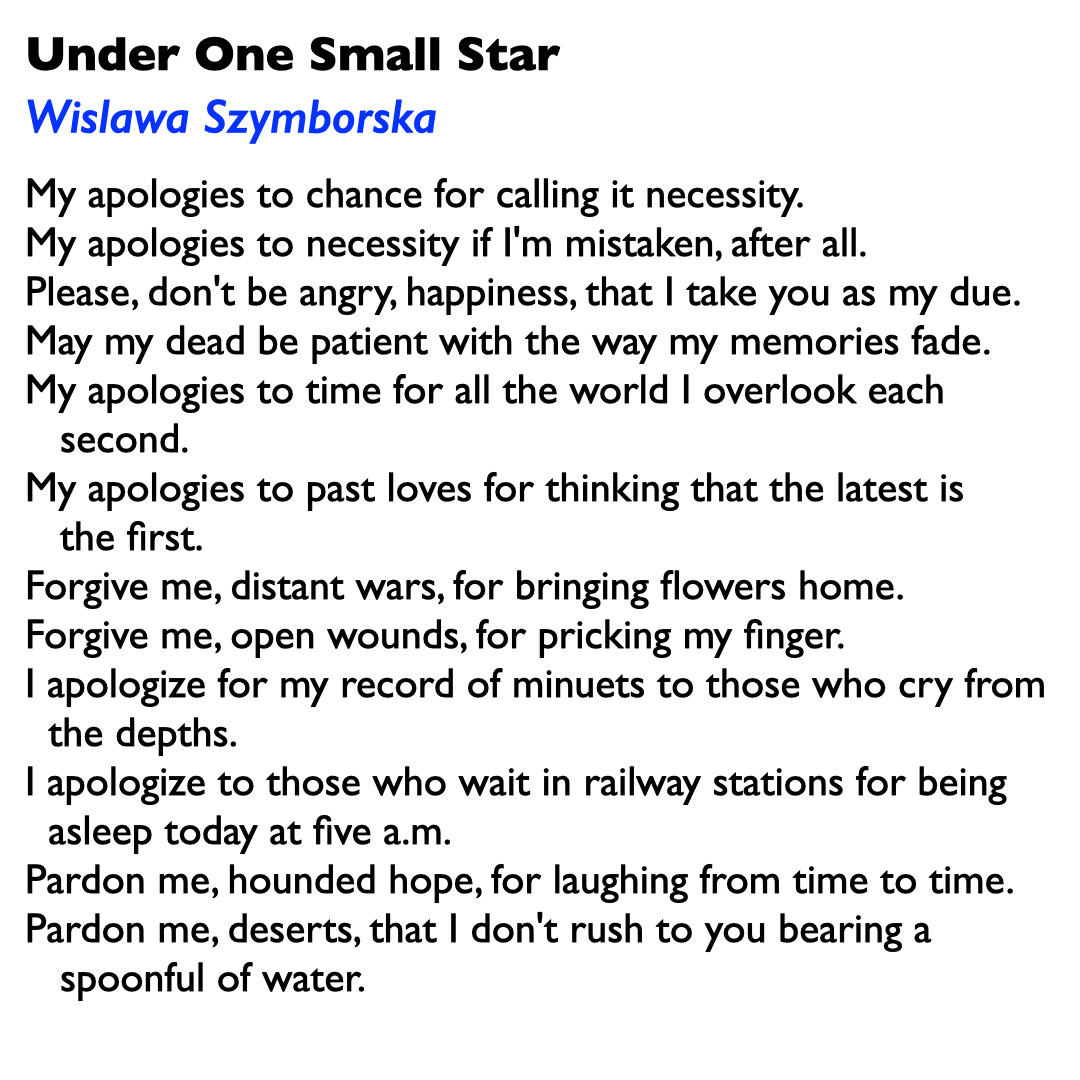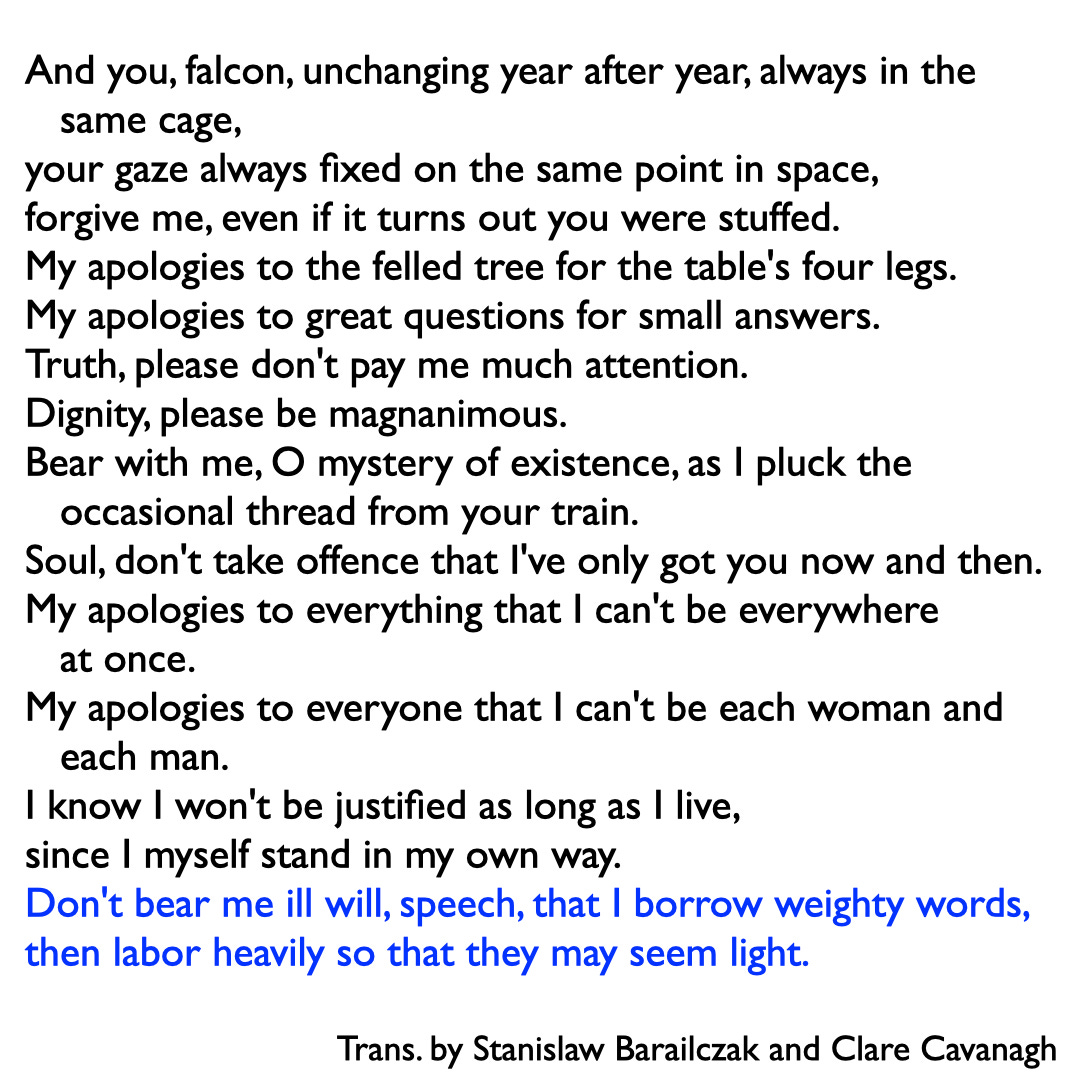Under One Small Star
Wislawa Szymborska
While writing about Lucille Clifton’s ‘birth-day’ yesterday, a line from Wislawa Szymborska’s Under one Small Star came back to me:
Don't bear me ill will, speech, that I borrow weighty words, then labour heavily so that they may seem light.
Szymborska, for me, is the epitome of the ‘poet on the periphery’, an idea that I have referred to often, in this newsletter. I did make reference to it a few days ago while sharing EV Ramakrishnan’s Untitled. Let me try and nuance this a bit further - This approach is something I have been toying with for quite some time now, as a way of writing the understory of experience.
One of the ideas that has inspired this comes from educational theoretical formulations. The anthropologist Jean Lave and the educational theorist Étienne Wenger proposed a fascinating new way of looking at learning as a ‘situated’ activity with deepening levels of participation in ‘communities of practice’. They coined the term ‘Legitimate Peripheral Participation’ to describe the process in which young learners participate peripherally in informal pedagogic systems of apprenticeship, performance and ritual. They argue that the very fact of participation that begins on the periphery of such communities nurtures ‘situated learning’ and evolution of thought and skill. This is not a theory of learning or a model for education.
I consider it to be a way of being with (and in) the world. It is the frame I use to enclose communities of artists. I would like to believe that the ‘Bombay Poets’ came together and grew like this, with young poets joining on the periphery, watching, learning, and creating, through interactions and social ‘events’ that included various degrees of mentors and practitioners. This is a democratic view of learning, one that decentres and rearticulates a community, by focussing on the blurred lines at the margins.
I am particularly attracted to this view because it exists in its own erasure. A disciple or rasik, inhabits this subjectivity with tenderness and careful participant observation, gradually receding into the ‘domain’ of practice with awareness and a propensity for innovation that has been earned, not by direct instruction, but by knowledge and skill acquisition, and perspective building through osmosis. One could apply this analytical frame to many of our own communities - artists’ communities, professional spaces, even friends who meet regularly to engage with a particular domain of practice (say a film club, or a reading group).
The poet on the periphery is the articulation of an individual’s interaction with the community, and with social reality.
Wislawa Szymborska’s body of work emerges from this vision of the world that unsettles the established solipsism of our age. If there is one thing that her poems have taught me, it is this decentred, marginal gaze. Consider these lines from the landmark poem from which one of her collections draws its name- View With a Grain of Sand.
We call it a grain of sand,
but it calls itself
neither grain nor sand.
It does just fine without a name,
whether general, particular,
permanent, passing,
incorrect, or apt.
and
The lake's floor exists floorlessly,
and its shore exists shorelessly.
Its water feels itself neither wet nor dry
and its waves to themselves are neither singular nor plural.They splash deaf to their own noise
on pebbles neither large nor small.
I reached this fascinating poem only after reading several of her other poems. At that time, I was a teenager attracted to her ironic poems about love, death and even the act of writing. When I met this poem, it was as if her entire philosophy was summarised in its soaring music.
Contrast this with another approach, which is as intense, but more serious. Think of the ‘confessional’, one strand of which seems to have morphed into the more gentle ‘self-care’/healing kind of poetry. Raju Tai’s guest post did talk a little about this approach.
Think of Plath’s exhortation that captured the futility she felt in her struggle, and how it mirrored and questioned the time’s affinity with the pursuit of power, and the inability to maintain personal freedom within the larger political context of strife, and dissonance.
“Is there no way out of the mind?”
Wislawa always makes me believe that there is…
P.S. If you are interested you could explore other poems by Wislawa Szymborska curated on Poetly - An Unexpected Meeting, Bodybuilders’ Contest, A Little Girl Tugs at the Tablecloth, Love at First Sight, Psalm, Classifieds
If you like what you read, do consider ‘buying me a coffee’.
(Matlab, if you can’t, that’s also fine, obviously. This is a free newsletter)
Note: Those, not in India, who’d like to support the work I do at Poetly, do write to me - poetly@pm.me.
Spread the word, and forward this to your loved ones. Subscribe if you are seeing this anywhere else, other than in your inbox.


